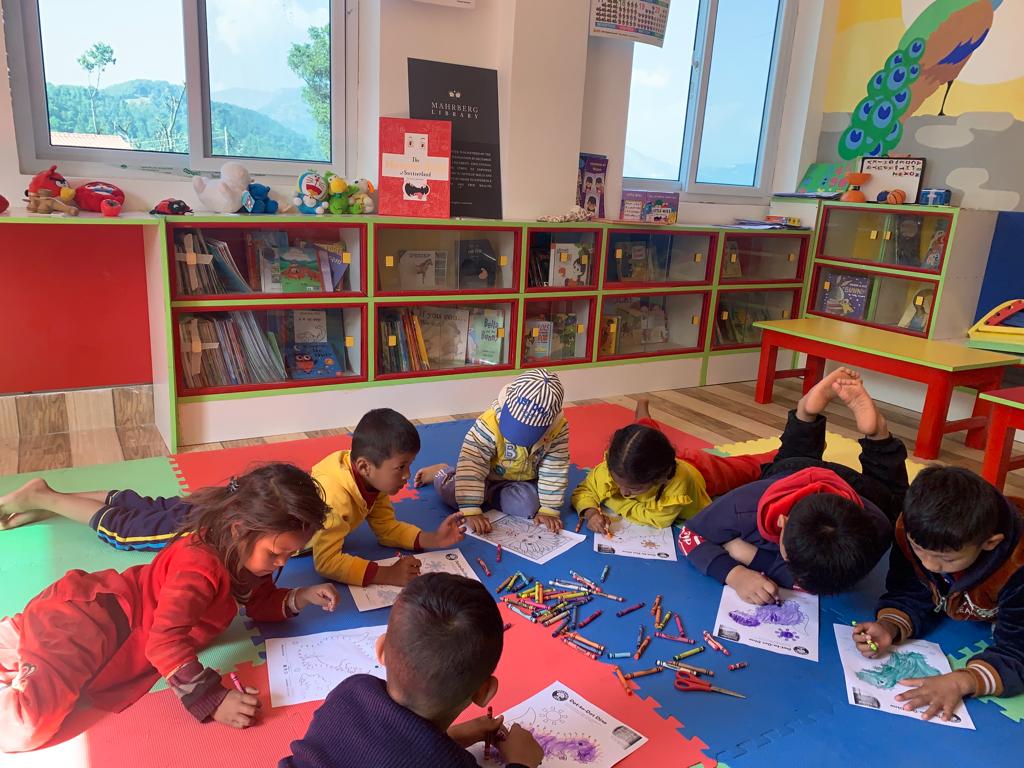Project Overview
Volunteer Childcare Abroad: Empowering Nepal’s Future
| 📍 | Location | Outskirts of Kathmandu & Okhaldhunga |
| 📅 | Start Dates | Every 1st & 3rd Monday |
| ⏳ | Duration | 2 weeks to 10 months |
| ⏰ | Working Hours | 3-6 hrs/day, 5 days/week |
| 🏡 | Accommodation & Food | Stay with a host family or at a volunteer hostel |
| 👥 | Eligibility | Open to volunteers 18+, families, couples, & groups |
| 🛡️ | Safety & Support | 24/7 assistance & secure placements |
| 🎓 | Orientation | 2-3 days on arrival training |
| 🌏 | Weekend Travel | Explore festivals, temples, Himalayas, & immerse in culture |
| 💰 | Fees | Transparent; covers essentials.Click here to learn more |

Volunteer Childcare Abroad: Empowering Nepal’s Future
Are you looking for Volunteer Childcare Abroad experiences that combine cultural immersion with meaningful impact? Do you want to participate in Childcare Volunteer Abroad Programs for rewarding international childcare volunteering in a stunning location like Nepal? Our project invites you to support underprivileged children at daycare centers, orphanages, and even Sponsor a child program on some community childcare programs. By offering your compassion, time, and skills, you can change their futures while savoring the cultural treasures that Nepal has to offer.
“Bright Horizons” bridges child development gaps within Nepal’s vulnerable communities. Volunteers in our program provide direct child assistance, from playing interactive games to imparting basic education fundamentals like counting or simple alphabets. Participating in Volunteer with Children Abroad roles shows how a few hours of personal attention can help children build self-confidence, develop social skills, and discover educational interests. It’s more than babysitting—it’s offering consistent adult care, positive role modeling, and emotional security for children who often lack stable guardians.
Background
Nepal, a land of towering peaks and rich cultural traditions, experiences significant socioeconomic hurdles that can adversely affect children’s well-being. According to UNICEF, around 1.6 million children in Nepal remain at risk of malnutrition or limited schooling, especially in rural and semi-urban regions. Government-led child welfare systems have improved, but the need for childcare volunteer opportunities overseas remains substantial. Orphanages, children’s homes, and community centers rely on local staff and meager resources. Volunteers stepping into Volunteer Teaching Children Abroad or Child Development Volunteer Programs Abroad roles fill vital workforce shortages and bring fresh perspectives. By championing new teaching methods or emotional support strategies, volunteers help ensure children’s holistic development.
Key Objectives
- Foundational Learning: Promote early literacy, basic numeracy, and interactive lessons for children aged 3–10, bridging the education gap.
- Emotional Support: Provide stable adult attention and mentorship, reinforcing children’s sense of security and belonging.
- Skill-Building for Caregivers: Collaborate with local staff to share best practices in early childhood approaches, health awareness, or inclusive care.
- Youth Engagement: Integrate older kids into youth mentorship volunteer abroad tasks, forming peer-led clubs that encourage leadership and confidence building.
The Need
- Overlooked Children: Many Nepali kids lack consistent guardians or quality educational resources. An estimated 11,000 children live in orphanages, many in dire need of reliable adult guidance or specialized attention.
- Community Impact: Extra adult volunteers provide immediate relief for caretaker-staffed institutions struggling to manage large child groups. This fosters improved child outcomes, from better hygiene to literacy breakthroughs.
Global Relevance
Child welfare is a universal imperative. Initiatives like community childcare volunteer projects abroad align with the UN Sustainable Development Goals—particularly SDG 4 (Quality Education) and SDG 3 (Good Health & Well-being). Engaging in these volunteer roles reaffirms every child’s right to safe, supportive environments that stimulate growth. Your international childcare volunteering thus resonates globally, bridging compassion across cultures.
Local Voices
“It’s tough to manage 20 toddlers with just two staff. Volunteer help—simple tasks, affectionate presence—makes all the difference. Our kids now greet mornings smiling!” – Mina, caretaker in rural Kathmandu.
10 Core Tasks
- Hands-On Childcare: Assist local caregivers with feeding, bathing, or guiding toddlers in daily routines, bridging essential comfort and emotional security.
- Basic Education Support: As part of child development volunteer programs abroad, offer playful lessons on colors, shapes, alphabets, and reading circles.
- Physical Activities & Playtime: Organize fun exercises, simple sports, or dance to ensure children develop motor skills and teamwork.
- Homework Help & After-School Program Volunteering Abroad: For older kids, provide homework supervision, extra tutoring, or one-on-one reading practice.
- Community Childcare Volunteer Projects Abroad: Host weekend or holiday camps for children in the broader community, bridging life skills or health tips.
- Special Needs Childcare Volunteering Abroad: Where relevant, address children with disabilities or mental health concerns, offering personalized attention or therapy-based activities.
- Volunteer in Children’s Hospitals Abroad: In some placements, accompany children during medical procedures or hospital stays, comforting them and assisting nurses by Volunteer abroad programs.
- Volunteer at Children’s Shelters Abroad: Engage with youth lacking stable homes, focusing on emotional resilience and bridging them to local educational or social resources.
- Orphanage Volunteer Abroad: Oversee daily schedules, help with cooking or cleaning, or create structured lessons in manners and hygiene.
- Youth Mentorship Volunteer Abroad: Provide guidance or career counseling to teenagers, helping them explore future schooling or vocational training options.
A typical day volunteering in childcare volunteer abroad programs might look like this:
- 08:30 – 09:15: Breakfast in your homestay or volunteer lodging.
- 09:15 – 10:00: Commute or walk to the childcare center, orphanage, or community preschool.
- 10:00 – 13:00: Supervise morning routines, help with hygiene, lead interactive lessons or story time.
- 13:00 – 14:00: Lunch, often dal bhat or local fare, possibly with staff or children.
- 14:00 – 16:00: Organize creative art sessions, sports hours, or after-school tutoring.
- 16:00 – 17:00: Head back to your accommodation and note daily progress.
- 17:00 – 18:00: Cultural immersion, personal reflection, or free time.
Some of the Special Projects
Childhood Nutrition Workshop: Volunteers with nutrition backgrounds might lead short seminars for caretakers, highlighting meal planning or local produce usage.
- Soft Skills Mentorship: If you’re skilled in counseling or child psychology, create short emotional intelligence sessions or self-esteem-building exercises for older children.
Skills and Requirements for this Volunteering Program
Required Skills
- Patience & Compassion: Children can be unpredictable and might come from traumatic backgrounds, necessitating a calm demeanor.
- Communication: Clear, friendly engagement fosters trust, which is vital for forging bonds quickly in an overseas setting.
- Adaptability: Resource constraints or schedule shifts demand creative problem-solving and open-mindedness.
Eligibility
- Age: Typically 18+ (some placements allow 16+ with guardians).
- Time Commitment: A minimum of two weeks is recommended; extended stays (4–12 weeks) deepen your impact and relationships.
- Documents: Valid passport, volunteer visa, recommended health and travel insurance.
Preferred Skills
- Childcare or Teaching Experience: Great for planning lessons, managing large groups, or designing structured play.
- Health Knowledge: If you possess first-aid or basic healthcare skills, you can handle minor child injuries or help with health check routines.
- Language: Basic Nepali phrases or willingness to pick up local greetings can accelerate rapport, though English often suffices.
Cultural Immersion
Volunteering in Nepal’s childcare sector also unveils immersive cultural facets:
- Festival Participation: Join Tihar (the festival of lights) or Dashain (the largest celebration) for communal feasting, music, and blessings.
- Traditional Meals: Dal Bhat (a rice-lentil staple) typically anchors daily sustenance. Volunteers often relish shared mealtime exchanges with local families or staff.
- Homestay Option: Some prefer living with a local family, forging daily cross-cultural dialogues, improving language skills, and forming heartfelt bonds.
Language Learning
- Basic Nepali: “Namaste” (hello), “Dhanyabad” (thank you), or “Khana khannu bhayo?” (Have you eaten?) can enthrall kids and staff alike.
- Daily Application: Over time, volunteers glean more words from caretaker chatter or child interactions, bridging communication gaps.
Accommodation
- Volunteer House: Dorm-style setup, bonding with co-volunteers, shared cooking or common lounge areas, forging an international camaraderie.
- Homestay: For more cultural engagement, living with a Nepali family fosters personal relationships, local cooking lessons, and daily language practice.
Meals
- Nepali Standard: Two or three meals daily, mostly dal bhat and veggies, sometimes pickles or light meats.
- Dietary Accommodations: Vegetarian or special diets can be arranged with prior notice.
Transportation
- Airport Pickup: Typically provided at Tribhuvan International Airport in Kathmandu, ensuring a smooth arrival.
- Commute: Buses, shared taxis, or foot journeys to your assigned children’s center or project site, depending on the distance.
On-Site Support
- Local Coordinators: Offer orientation, day-to-day guidance, and cultural assimilation help.
- Staff at Orphanages / Centers: Teachers, social workers, and NGO heads ensure that your tasks complement local needs.
Health and Safety
- Vaccinations: Consult a physician about Tetanus, Hepatitis, or Typhoid before traveling.
- Travel Insurance: Coverage is crucial for medical or trip-related emergencies.
- Emergency Protocol: Project staff maintain contact with local hospitals or authorities, guaranteeing swift attention if needed.
Volunteer Program Fees and Inclusions
Check the Program Fees page for a detailed cost breakdown. Generally includes:
- Accommodation (volunteer house or homestay)
- Meals (two or three local dishes daily)
- Orientation and Staff Support (for scheduling, translations, and cultural bridging)
- Essential Childcare Resources (toys, art supplies, or minimal first-aid materials)
Not included: flights, visas, personal insurance, or personal excursion costs.
Volunteer Impact
- Personal Growth: Volunteers refine cross-cultural communication, creative problem-solving, and child management.
- Professional Development: If you aim for a career in education, social work, or psychology, these real-world experiences bolster your résumé significantly.
- Memorable Connections: Emotional ties with kids can last beyond your volunteer period, forming global friendships or leading to ongoing sponsorships.
Community Impact
- Enhanced Child Welfare: With volunteers providing daily attention, children often experience better emotional stability, improved learning outcomes, and a broader worldview.
- Local Staff Relief: Overworked caretakers appreciate the added workforce, enabling them to handle administrative duties or individual child cases more thoroughly.
- Long-Term Inspiration: Children taught by foreign volunteers often adopt bigger dreams—like international studies, tourism-based skills, or entrepreneurial ambitions—boosting future potential.
Statistic: A 2021 study from the Nepal Ministry of Education found that consistent volunteer-led tutoring correlated with a 30% rise in reading comprehension among primary-age students.

Alice

Harsh
Local Impact Stories

Rita

Rajesh
Application Process
Ready to inspire and empower? Follow these steps to join “Bright Horizons: Volunteer Childcare Abroad in Nepal”:
- Complete the Online Application: Fill out your details at VolunteeringNepal.org/apply-now.
- Submit Your Resume: Provide your CV plus two references (professional, academic, or personal).
- Await Confirmation: Our staff will confirm acceptance and provide orientation and next-step instructions.
- Pay the Booking Fee: A €150 deposit secures your spot, ensuring logistical preparation.
- Receive the Pre-Departure Pack: Access cultural guidelines, recommended immunizations, and childcare tutorials.
- Final Payment: Pay the remaining program fees upon arrival or via wire transfer.
FAQs
Not strictly. Enthusiasm, empathy, and a willingness to learn often suffice. Our orientation and local staff guide you through daily tasks.
Generally, yes. We ensure secure volunteer houses or vetted homestays. Nepalis are renowned for warmth and hospitality, creating a supportive environment.
Many children learn basic English. Younger ones rely on local staff or older peers for interpretation. Simple Nepali phrases go a long way, too.
You can help with daily supervision, personal care, or therapy-assisting tasks under the guidance of local specialists. We place you based on skill and interest.
Absolutely. Many volunteers maintain contact, sponsor children’s schooling, or periodically raise funds for better resources.
Yes. For prospective teachers, social workers, or counselors, these experiences enrich résumés, demonstrating cross-cultural empathy and practical field skills.
- We partner only with vetted nonprofits. Volunteers fill needed roles, not displacing local staff. Child protection guidelines and daily oversight protect kids and maintain ethical engagement.
Join Us Today to Make a Difference!
Nepal’s children yearn for nurturing environments, educational stimuli, and compassion from caring adults. Signing up for Volunteer Childcare Abroad initiatives creates those conditions, forging trust, security, and academic momentum in each child’s journey. Whether you choose Childcare Volunteer Abroad Programs or broader International Childcare Volunteering tasks, your commitment echoes through classrooms, families, and entire communities.
- Volunteer: Offer day-to-day care, creative lessons, or personal mentorship in local orphanages or community centers.
- Intern: Blend your academic track (social work, education, psychology) with immersive field application.
- Donate: Contribute educational supplies, sponsor facility upgrades, or help expand after-school programs.
- Share: Spread the word among friends and social media—together, we amplify impact.
Apply Now or email us at support@vin.org.np. Let’s secure a bright tomorrow for Nepal’s children. You can transform a child’s life path—one day, one smile, one hug at a time.
